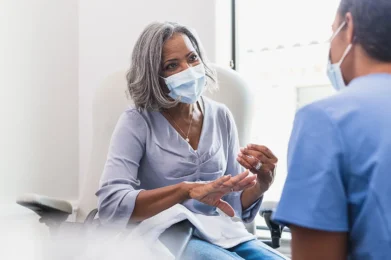In This Article:
- Menopause is the stage of life that marks the end of your menstrual cycles. It’s diagnosed after you have gone 12 months without a menstrual period.
- Most women begin developing menopause symptoms approximately four years before their last period. Symptoms will often continue until about four years after your last period.
- Every woman’s experience with menopause is different. In the months or years leading up to menopause, you may experience various signs or symptoms.
Menopause is a transition into a new stage of life — but what is menopause, exactly? While menopause is a natural biological process, you’ll often experience various symptoms that affect your physical and emotional health. A few lifestyle changes can help you feel better and boost your overall health in the long term. Read on to learn more about menopause, along with tips for managing your symptoms, to help you live a healthy and happy life.
Understanding Menopause
Menopause is the stage that marks the end of your menstrual cycles. It’s diagnosed after you have gone 12 months without a menstrual period. The term often refers to the changes you go through just before or after you stop having your period, marking the end of the reproductive years. Menopause can last several years and consists of three stages:
- Perimenopause is the transitional time before menopause and includes the 12 months that follow your last period.
- Menopause starts either 12 months after the last period or when menstruation has stopped for a clinical reason, like removing the ovaries.
- Postmenopause is the years after menopause; however, it’s often difficult to know when menopause is finished and postmenopause starts.
The median age for menopause is 51, with most women developing symptoms approximately four years before their last period. Menopause symptoms often continue for about four years after your last period. Keep in mind several factors will determine when you’ll begin menopause, such as genetics and ovary health.
Symptoms of Menopause
Every woman’s experience with menopause is different. In the months or years leading up to menopause, you may experience various signs or symptoms. Some may start before menopause, while some continue after it. These changes include:
- Lower fertility can happen as you approach the end of your reproductive state when estrogen levels begin to fall. This reduces your chances of becoming pregnant.
- Irregular menstruation is often the first sign that menopause is approaching. Your period may occur less frequently than usual, and it may be heavier or lighter.
- Vaginal dryness, itching and discomfort may start during perimenopause and continue into menopause.
- Hot flashes may start in the face, neck or chest and progress throughout your body. Some women experience night sweats or cold flashes in addition to or instead of hot flashes.
- Emotional changes, such as anxiety, depression and low mood, are common during menopause. It’s also not unusual to experience times of irritability and crying spells.
- Physical changes like weight gain, a buildup of fat around the abdomen, urinary incontinence and more can also develop during menopause.
How to Treat Menopause
Menopause is a natural process with many symptoms going away over time. If they begin to cause problems, though, many treatments can help you feel better. Your doctor may suggest:
- Hormone therapy to balance the body’s hormone levels. This comes in various forms, including topical creams and skin patches to help reduce hot flashes.
- Nonhormone medications called selective estrogen receptor modulators (SERMs) can help your body use its estrogen to treat hot flashes and vaginal dryness.
- Medications for osteoporosis may also be needed. Menopause often leads to osteoporosis and taking vitamin D supplements can help keep your bones strong.
These aren’t the only ways to manage your menopause symptoms. Simple lifestyle changes can help you deal with your symptoms. They include:
- Drinking cold water, sitting or sleeping near a fan and dressing in layers if you have hot flashes.
- Using an over-the-counter vaginal moisturizer or lubricant for dryness.
- Eating a variety of food and keeping a healthy weight helps with hot flashes.
- Exercising regularly to sleep better and prevent conditions like osteoporosis.
- Practicing yoga or deep breathing to help you relax.
Additionally, some studies have found that soy products can relieve hot flashes, but researchers are still looking into it. There aren’t many studies on whether other dietary or herbal supplements work for menopause symptoms. Make sure to talk to your doctor before starting any new treatments.
Talk with physicians at your nearby Valleywise Community Health Center to learn more about what menopause is or call 1 (833) VLLYWSE to schedule an appointment.
Sources:
- https://www.womenshealth.gov/menopause
- https://www.acog.org/womens-health/faqs/the-menopause-years
- https://www.menopause.org/for-women/menopauseflashes/menopause-symptoms-and-treatments/are-we-there-yet-navigate-now-with-our-guided-menopause-tour
- https://www.menopause.org/for-women/what-selective-estrogen-receptor-modulators-(serms)-can-do-for-you
- https://www.ncbi.nlm.nih.gov/pmc/articles/PMC2981010/







